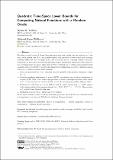| dc.contributor.author | McKay, Dylan M. | |
| dc.contributor.author | Williams, Richard Ryan | |
| dc.date.accessioned | 2022-09-15T19:17:41Z | |
| dc.date.available | 2021-11-05T13:40:24Z | |
| dc.date.available | 2022-09-15T19:17:41Z | |
| dc.date.issued | 2019-01 | |
| dc.identifier.uri | https://hdl.handle.net/1721.1/137452.2 | |
| dc.description.abstract | © Dylan M. McKay and Richard Ryan Williams. We define a model of size-S R-way branching programs with oracles that can make up to S distinct oracle queries over all of their possible inputs, and generalize a lower bound proof strategy of Beame [SICOMP 1991] to apply in the case of random oracles. Through a series of succinct reductions, we prove that the following problems require randomized algorithms where the product of running time and space usage must be Ω(n2/poly(log n)) to obtain correct answers with constant nonzero probability, even for algorithms with constant-time access to a uniform random oracle (i.e., a uniform random hash function): ▬ Given an unordered list L of n elements from [n] (possibly with repeated elements), output [n] − L. ▬ Counting satisfying assignments to a given 2CNF, and printing any satisfying assignment to a given 3CNF. Note it is a major open problem to prove a time-space product lower bound of n2−o(1) for the decision version of SAT, or even for the decision problem Majority-SAT. ▬ Printing the truth table of a given CNF formula F with k inputs and n = O(2k) clauses, with values printed in lexicographical order (i.e., F(0k), F(0k−11), . . ., F(1k)). Thus we have a 4k/poly(k) lower bound in this case. ▬ Evaluating a circuit with n inputs and O(n) outputs. As our lower bounds are based on R-way branching programs, they hold for any reasonable model of computation (e.g. log-word RAMs and multitape Turing machines). | en_US |
| dc.language.iso | en | |
| dc.relation.isversionof | 10.4230/LIPIcs.ITCS.2019.56 | en_US |
| dc.rights | Creative Commons Attribution 4.0 International license | en_US |
| dc.rights.uri | https://creativecommons.org/licenses/by/4.0/ | en_US |
| dc.source | DROPS | en_US |
| dc.title | Quadratic time-space lower bounds for computing natural functions with a random oracle | en_US |
| dc.type | Article | en_US |
| dc.identifier.citation | 2019. "Quadratic time-space lower bounds for computing natural functions with a random oracle." Leibniz International Proceedings in Informatics, LIPIcs, 124. | en_US |
| dc.contributor.department | Massachusetts Institute of Technology. Department of Electrical Engineering and Computer Science | en_US |
| dc.contributor.department | Massachusetts Institute of Technology. Computer Science and Artificial Intelligence Laboratory | en_US |
| dc.relation.journal | Leibniz International Proceedings in Informatics, LIPIcs | en_US |
| dc.eprint.version | Final published version | en_US |
| dc.type.uri | http://purl.org/eprint/type/ConferencePaper | en_US |
| eprint.status | http://purl.org/eprint/status/NonPeerReviewed | en_US |
| dc.date.updated | 2021-03-25T18:34:31Z | |
| dspace.orderedauthors | McKay, DM; Williams, RR | en_US |
| dspace.date.submission | 2021-03-25T18:34:32Z | |
| mit.journal.volume | 124 | en_US |
| mit.license | PUBLISHER_CC | |
| mit.metadata.status | Publication Information Needed | en_US |
